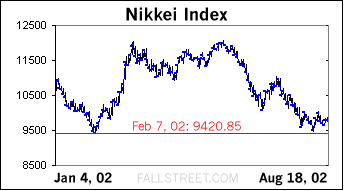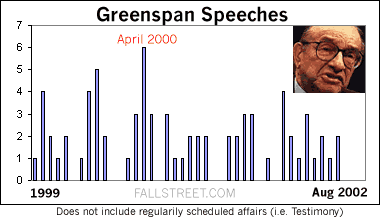|
 |
"We must halt this fall in shares. It's like diarrhea, we must stop it. The stock-buying body was set up precisely to absorb such selling. If February is such a month, there is no excuse for not functioning at that crucial time." Finance Minister Masajuro Shiokaw – Feb 7
Suffice it to say, what seemed like a good idea in early 2002, or buying stocks directly from near insolvent banks, could soon be regarded as a mistake. The SSB had $4 trillion to spend (waste?) on stock purchases. If they run out of money and equity prices continue to decline what the government will have essentially done is bailed out banks at the cost of taxpayers. Is the U.S. threatening to become like Japan or vice versa?
Up – Down – All Around
The U.S. markets have few reports to key on in the upcoming week (Leading Indicators, Trade Balance, earnings from HD and other retailers). That said, there is speculation that Bush will soon ease tax constraints on investors and/or adopt new anti-recession policies, and rumor has it that CEOs will be holding a parade and photo-op session on Wall Street to ring in a new era of honesty (CNBC with have live coverage). Additionally, there has been significant speculation that since Treasury yields struck 40-year lows (10Yr) last week money is destined to continue funneling into stocks (the logic being that since Treasury’s are unattractive stocks must be attractive).
Point being, if investors continue to ignore tumbling corporate earnings estimates and soft economic data the markets could rally. Yes, this is a big ‘if’ (and one that I do not think will come to pass). However, remember that the markets are on a four week winning streak because of short covering, a Brazilian bailout, expected Fed cuts, CEO certification, and a reversal in Treasury’s. No one argues that the outlook for corporate earnings has improved since the markets ‘bottomed’.
“Third-quarter estimates are in kind of a freefall right now"
Chuck Hill (Aug 18, 02, AP).
Minute By Minute.
The FOMC minutes for the June 25, 26 proved one thing: the Fed is not clairvoyant. To be sure, a number of Fed members argued in June that the Fed’s monetary stance may be “too accommodative”, and most members agreed that the U.S. economy was still in recovery mode. By contrast, last weeks FOMC statement hinted that monetary policy may soon be even more accommodative and “the risks are weighted mainly toward conditions that may generate economic weakness.”
What the FOMC minutes and volatile action in the U.S. economy continue to prove is that stock prices are a solid indicator for the direction of U.S. economy. With this in mind, the Fed is not making up excuses when they state that economic weakness is, in part, the result of “heightened uncertainty related to problems in corporate reporting and governance.” Rather, the Fed is admitting their limitations – everyone’s limitations – when it comes to understanding the U.S. economy.
Those that choose to ignore the $7+ Trillion in paper wealth that has been destroyed in the markets since the bear market began must assume that shareholders are largely able to cope with their losses today. However, as witnessed in July, or when record redemptions took place and a steep drop in consumer confidence unfolded, there is a limit to the amount of losses many investors can cope with.
Point being, the longer the bear market drags on the more obvious the evidence is that stock prices are leading the economy and not vice versa.
A Different Indicator
Since 1999 Greenspan has made numerous speeches at special luncheons and conferences. His speech total peaked at 6 in April 2000 and has been on the decline ever since. In fact, Greenspan has not made a single speech since March. Why doesn’t Greenspan have anything to say?
 |
10 Sessions Until September
Just as everyone believed that a new bottom was required before prices could rebound in July, the perception that the markets will remain inside of a tight range until at least September may take hold. Believing makes it real.
However, with the U.S. economy threatening to double-dip, oil prices having been on the rise, earnings estimates in decline, and September being historically the worst month for the stocks, there are not many reasons to be optimistic that the markets are not headed lower.
All data and information within these pages is thought to be taken from reliable sources but there is no guarantee as such. All opinions expressed on this site are opinions and should not be regarded as investment advice.
Copyright © 2000, 2001, 2002
FallStreet.com
|
|
|
|